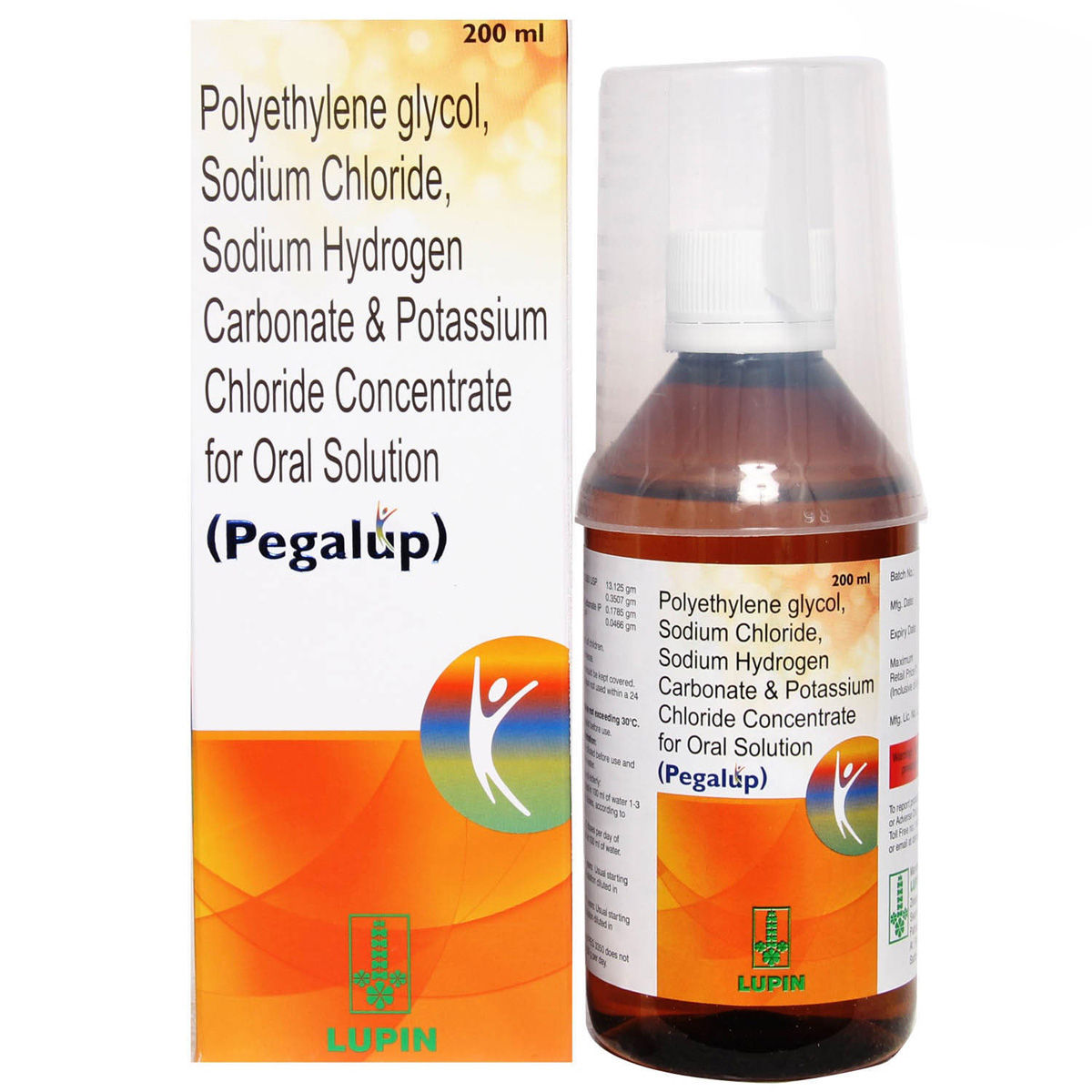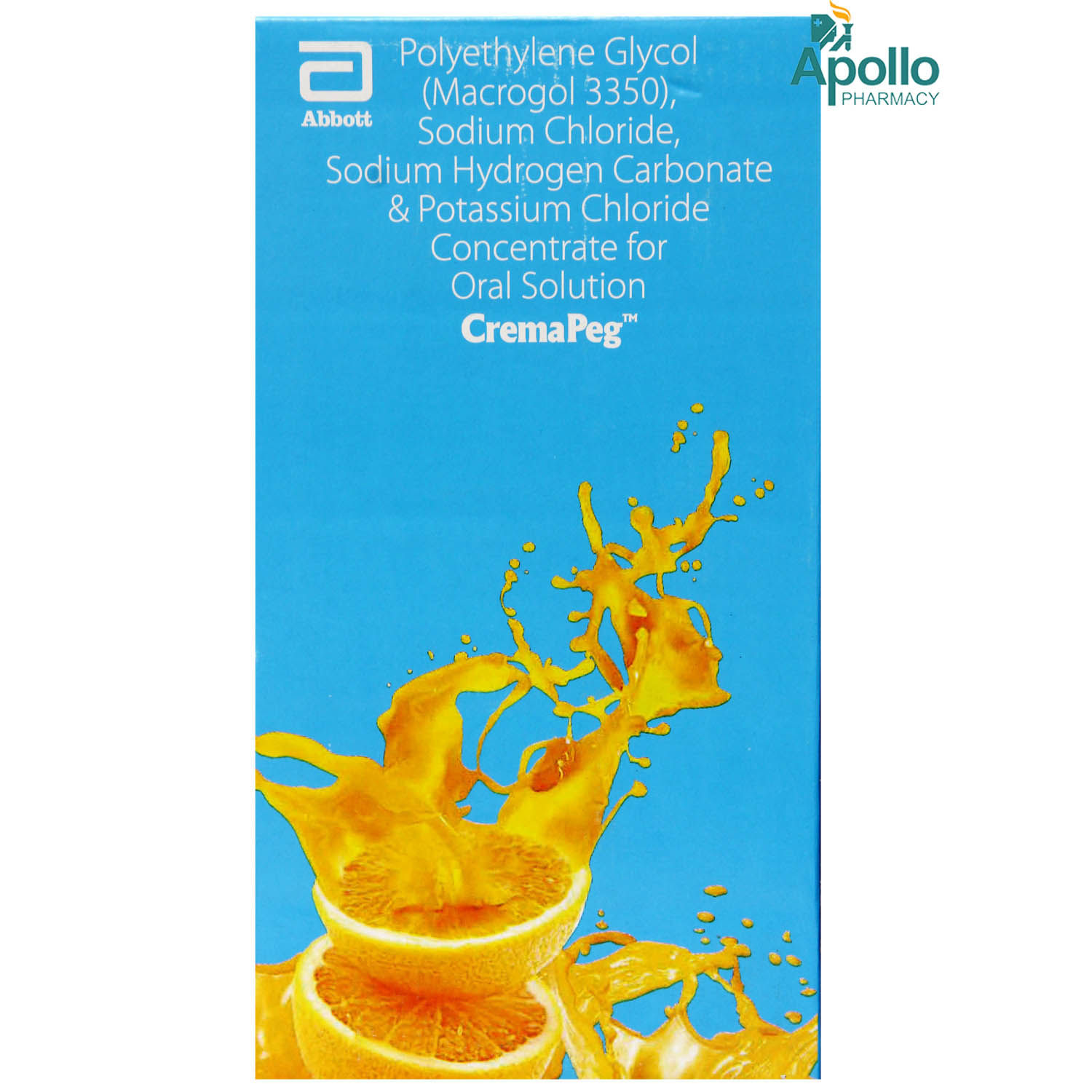Polyethylene Glycol 3350+sodium Chloride+sodium Hydrogen Carbonate+potassium Chloride
About Polyethylene Glycol 3350+sodium Chloride+sodium Hydrogen Carbonate+potassium Chloride
Polyethylene Glycol 3350+potassium Chloride+sodium Chloride+sodium Hydrogen Carbonate belongs to the class of medicines called stimulant laxatives used to cleanse the colon before a colonoscopy or barium enema (an x-ray test that determines abnormalities in the colon). Colonoscopy or barium enema is a procedure that involves inserting a flexible fibre-optic device into the anus to inspect the colon for identifying the extent of various diseases present in the large intestine or colon.
Polyethylene Glycol 3350+potassium Chloride+sodium Chloride+sodium Hydrogen Carbonate contains Polyethylene glycol 3350, Sodium chloride, Sodium hydrogen carbonate, and Potassium chloride. Together, these salts increase the water content in the intestine and stimulate bowel movement. Thereby, Polyethylene Glycol 3350+potassium Chloride+sodium Chloride+sodium Hydrogen Carbonate helps to cleanse the large intestine so that the colonoscopy can be performed comfortably. Polyethylene Glycol 3350+potassium Chloride+sodium Chloride+sodium Hydrogen Carbonate is rich in mineral salts that replaces lost electrolytes and prevent dehydration.
Take Polyethylene Glycol 3350+potassium Chloride+sodium Chloride+sodium Hydrogen Carbonate exactly as directed. Certain typical side effects, such as diarrhoea, gastrointestinal pain/cramps, and abdominal discomfort, may occur in some circumstances. Most of these side effects do not necessitate medical treatment and will subside gradually over time. However, if you are experiencing these side effects regularly, you should consult your doctor.
Consult your doctor before taking Polyethylene Glycol 3350+potassium Chloride+sodium Chloride+sodium Hydrogen Carbonate if you are pregnant or breastfeeding. Let your doctor know if you have gastrointestinal obstruction, bowel perforation, and gastric retention. Drink plenty of fluids whilst taking Polyethylene Glycol 3350+potassium Chloride+sodium Chloride+sodium Hydrogen Carbonate to prevent dehydration. Keep your doctor informed about your health condition and all the medicines you take to rule out any side effects.
Uses of Polyethylene Glycol 3350+sodium Chloride+sodium Hydrogen Carbonate+potassium Chloride
Medicinal Benefits
Polyethylene Glycol 3350+potassium Chloride+sodium Chloride+sodium Hydrogen Carbonate is a stimulant laxative used to clear the bowel before medical procedures such as colonoscopy or barium enema. It works by increasing water retention in the intestine, which causes a bowel movement. This clears the colon so that the colonoscopy can be performed easily. Polyethylene Glycol 3350+potassium Chloride+sodium Chloride+sodium Hydrogen Carbonate is rich in mineral salts that replaces lost electrolytes and prevent dehydration.
Directions for Use
Storage
Side Effects of Polyethylene Glycol 3350+sodium Chloride+sodium Hydrogen Carbonate+potassium Chloride
Abdominal pain/cramps
Diarrhoea
Abdominal discomfort
Drug Warnings
Do not use this medication without a doctor's prescription to treat constipation though it is laxative medicine. It is not intended to treat constipation. It is intended to cleanse the colon (bowel) before a colonoscopy. If you are pregnant or breastfeeding, seek medical advice from your doctor before using Polyethylene Glycol 3350+potassium Chloride+sodium Chloride+sodium Hydrogen Carbonate. Inform your doctor if you have gastrointestinal obstruction, bowel perforation, and gastric retention. Before taking Polyethylene Glycol 3350+potassium Chloride+sodium Chloride+sodium Hydrogen Carbonate, make sure your doctor knows your medical history and other medications you are taking. This will help to rule out any potential side effects.
Drug Interactions
Drug-Drug Interactions: Polyethylene Glycol 3350+potassium Chloride+sodium Chloride+sodium Hydrogen Carbonate may have interaction with medicines used to treat serious bacterial infections (e.g. amikacin, amikacin liposome, kanamycin, neomycin, netilmicin, plazomicin, streptomycin), HIV medication (e.g. cabotegravir, dolutegravir), medication is used to treat bladder cancer (e.g. erdafitinib), and medication is used to treat eye infections (e.g. tobramycin).
Drug-Food Interactions: No interactions found/established.
Drug-Disease Interactions: Polyethylene Glycol 3350+potassium Chloride+sodium Chloride+sodium Hydrogen Carbonate may have interactions with conditions such as depression, inflammatory bowel disease, intestinal obstruction disorders, cardiac disease, renal dysfunction, and myasthenia gravis (abnormal weakness of certain muscles).
Drug-Drug Interactions Checker List:
Safety Advice

Alcohol
cautionIt is not known if alcohol interacts with Polyethylene Glycol 3350+potassium Chloride+sodium Chloride+sodium Hydrogen Carbonate. However, it is advisable not to take or limit alcohol as a precautionary measure.

Pregnancy
cautionPolyethylene Glycol 3350+potassium Chloride+sodium Chloride+sodium Hydrogen Carbonate should be used in pregnant women only if clinically needed, and benefits outweigh the risks.

Breast Feeding
cautionConsult your doctor before taking Polyethylene Glycol 3350+potassium Chloride+sodium Chloride+sodium Hydrogen Carbonate if you are breastfeeding. Your doctor will decide if it can be taken by breastfeeding mothers or not.

Driving
cautionPolyethylene Glycol 3350+potassium Chloride+sodium Chloride+sodium Hydrogen Carbonate is unlikely to affect your ability to drive. However, drive only if you are alert.

Liver
cautionIf you have liver illness or impairment, talk to a doctor before taking Polyethylene Glycol 3350+potassium Chloride+sodium Chloride+sodium Hydrogen Carbonate. Your doctor will only provide a prescription if the benefits outweigh the risks.

Kidney
cautionIf you have kidney illness or impairment, talk to a doctor before taking Polyethylene Glycol 3350+potassium Chloride+sodium Chloride+sodium Hydrogen Carbonate. Your doctor will only provide a prescription if the benefits outweigh the risks.

Children
cautionPolyethylene Glycol 3350+potassium Chloride+sodium Chloride+sodium Hydrogen Carbonate should be given to children only if advised by the doctor.
Habit Forming
Diet & Lifestyle Advise
Try maintaining a balanced diet that includes fresh fruits and vegetables.
Stay hydrated drink enough water and fluids.
Exercise regularly and stay fit.
Get enough sleep.
Try making time to empty your bowels whenever the body tells you to.
Eat fibre-rich foods such as whole-wheat bread, oatmeal, flaxseed, nuts, beans, lentils, fruits (berries, apples, oranges, bananas, pears, figs), and vegetables (broccoli, spinach, sweet potatoes, avocados).
Patients Concern
Disease/Condition Glossary
Colonoscopy: A colonoscopy is a procedure that examines the inside of your bowels. This test can assist in determining what is causing your gastrointestinal issues. A long, thin, flexible tube containing a small camera is inserted into your stomach.
Barium enema: It is an x-ray test that determines abnormalities in the lower gastrointestinal tract.
FAQs
Polyethylene Glycol 3350+potassium Chloride+sodium Chloride+sodium Hydrogen Carbonate belongs to the class of medicines called stimulant laxatives used to cleanse the colon before a colonoscopy or barium enema (an x-ray test that determines abnormalities in the colon).
Polyethylene Glycol 3350+potassium Chloride+sodium Chloride+sodium Hydrogen Carbonate works by increasing water retention in the intestine, causing a bowel movement. This clears the colon, making it easier to do the colonoscopy.
Diarrhoea might occur if Polyethylene Glycol 3350+potassium Chloride+sodium Chloride+sodium Hydrogen Carbonate is taken in larger doses. Stop taking Polyethylene Glycol 3350+potassium Chloride+sodium Chloride+sodium Hydrogen Carbonate and consult your doctor if you experience severe diarrhoea.
Cleaning your colon will allow your doctor to see more clearly inside your colon during a colonoscopy.
This medication is only available with a doctor's prescription. Polyethylene Glycol 3350+potassium Chloride+sodium Chloride+sodium Hydrogen Carbonate is used to cleanse the colon (bowel) before a colonoscopy. It should be taken only if advised by the doctor.
Polyethylene Glycol 3350+potassium Chloride+sodium Chloride+sodium Hydrogen Carbonate is not recommended for patients with inflammatory bowel disease and intestinal obstruction disorders. Please inform your doctor before taking Polyethylene Glycol 3350+potassium Chloride+sodium Chloride+sodium Hydrogen Carbonate if you have any liver disorders. Your doctor will only provide a prescription if the benefits outweigh the risks.
Available Medicines for
Polyethylene Glycol 3350+sodium Chloride+sodium Hydrogen Carbonate+potassium Chloride










